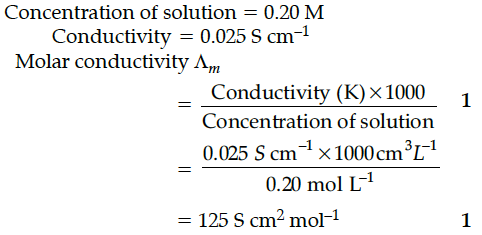The conductivity of 0.20 M solution of KCl at 298 K is 0.025 Scm⁻¹. Calculate its molar conductivity.

The conductivity of a 0.01 M solution of acetic acid at 298 K is 1.65 x 10⁻⁴ S cm⁻¹. Calculate molar conductivity (Λm) of the solution.
The conductivity of metals decreases while that of electrolytes increases with increase in temperature. Why?
The electrical resistance of a column of 0.05 M KOH solution of diameter 1 cm and length 45.5 cm is 4.55 × 10³ ohm. Calculate its molar conductivity.
The potential of a hydrogen electrode at pH = 10 is
a. 0.591 V
b. 0.00 V
c. – 0.591 V
d. -0.059 V
State Kohlrausch law of independent migration of ions. Why does the conductivity of a solution decrease with dilution ?
What is meant by elevation in boiling point? Why is it a colligative property?
Calculate pH of following half-cell. Pt, H2 / H2SO4 , if its electrode potential is 0.03V.
Define azeotropes. What type of azeotrope is formed by positive deviation from Raoult’s law ?
Give an example.
The conductivity of an aqueous solution of NaCl in a cell is 92 Ω−1 cm−1 the resistance offered by this cell is 247.8 Ω . Calculate the cell constant.
Describe the oxidising action of potassium dichromate and write the ionic equations for its reaction with (i) an iodide (ii) H₂S.
